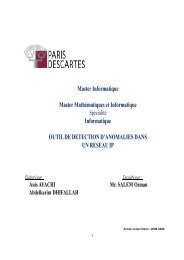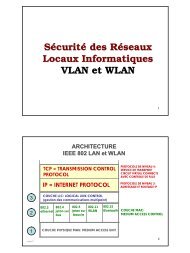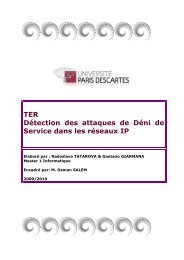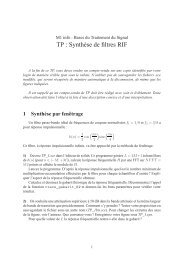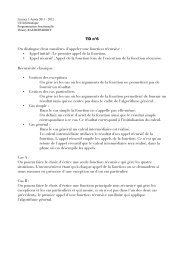Th`ese de Doctorat de l'université Paris VI Pierre et Marie Curie Mlle ...
Th`ese de Doctorat de l'université Paris VI Pierre et Marie Curie Mlle ...
Th`ese de Doctorat de l'université Paris VI Pierre et Marie Curie Mlle ...
Create successful ePaper yourself
Turn your PDF publications into a flip-book with our unique Google optimized e-Paper software.
functions, the problem can be solved using standard linear programming (LP) techniques.<br />
Finally, when all these assumptions do not hold, the OBA mo<strong>de</strong>l can not be applied. For<br />
this reason we further <strong>de</strong>velop two other heuristic algorithms, <strong>de</strong>tailed in the following,<br />
that do not rely on any assumption concerning the users utility functions.<br />
Simple Dynamic Bandwidth Allocation Algorithm<br />
When neither the utility functions nor the offered loads can be easily measured for all<br />
sources, we propose the Simple Dynamic Bandwidth Allocation algorithm (SDBA) <strong>de</strong>-<br />
tailed in Table 5.1, which is an exten<strong>de</strong>d version of the max-min fair allocation algorithm<br />
introduced in [13].<br />
The simple rationale behind SDBA is the following: the extra-bandwidth is allocated<br />
equally to all greedy sources bottlenecked at the same link, starting from the most congested<br />
bottleneck link. SDBA takes as input the s<strong>et</strong> Kg of greedy connections, the link s<strong>et</strong> L with<br />
the residual capacity on each link l, Rl, and the routing matrix al k , and produces as output<br />
the amount of extra-bandwidth f n k ,k ∈ Kg that is assigned to each greedy connection<br />
during the n − th update interval, so that finally rn k = srk + f n k , ∀k ∈ Kg.<br />
Iterative Dynamic Bandwidth Allocation Algorithm<br />
Note that, since SDBA does not take into account sources’ offered load, it can allocate to<br />
a source more bandwidth than it can use, thus wasting it. For this reason, when utility<br />
functions are unknown while sources’ offered load can be measured online at ingress routers,<br />
we propose the Iterative Dynamic Bandwidth Allocation (IDBA) algorithm <strong>de</strong>tailed in<br />
Table 5.2.<br />
IDBA takes as input the offered load Ol n−1<br />
k ,k ∈ Kg, besi<strong>de</strong>s all the inputs consi<strong>de</strong>red<br />
in SDBA, to compute the amount of extra-bandwidth f n k ,k ∈ Kg that is assigned to each<br />
greedy connection during the n − th update interval.<br />
For every update interval n, all greedy connections, k ∈ Kg, are marked as Non-served<br />
45




